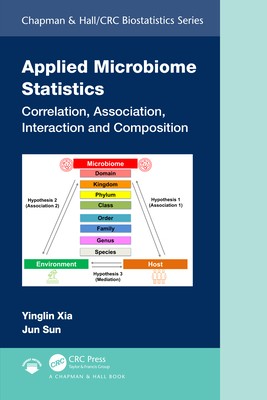
- We will send in 10–14 business days.
- Author: Yinglin Xia
- Publisher: CRC Press
- ISBN-10: 036763970X
- ISBN-13: 9780367639709
- Format: 15.6 x 23.4 x 2.5 cm, hardcover
- Language: English
- SAVE -10% with code: EXTRA
Reviews
Description
This unique book officially defines Microbiome Statistics as a specific new field of statistics, and addresses the statistical analysis of correlation, association, interaction and composition in microbiome research. It also defines microbiome as a hypothesis-driven experimental science, describes two microbiome research themes and six unique characteristics of microbiome data, as well as investigates challenges for statistical analysis of microbiome data using the standard statistical methods. This book is useful for researchers of biostatistics, ecology, and data analysts.
- Presents a thorough overview of statistical methods in microbiome statistics of parametric and nonparametric correlation, association, interaction and composition adopted from classical statistics, ecology, and specifically designed for microbiome research
- Performs step-by-step statistical analysis of correlation, association, interaction and composition in microbiome data
- Discusses the issues of statistical analysis of microbiome data: high-dimensionality, compositionality, sparsity, overdispersion, zero-inflation, and heterogeneity
- Investigates statistical methods on multiple comparisons and multiple hypothesis testing and applications to microbiome data
- Introduces a series of exploratory tools to visualize composition and correlation of microbial taxa by barplot, heatmap, and correlation plot.
- Employs Kruskal-Wallis rank-sum test to perform model selection for further multi-omics data integration
- Offers R codes, and the data sets from the authors' real microbiome research and publicly available data for the analysis used
- Remarks on the advantages and disadvantages of each of the methods used
EXTRA 10 % discount with code: EXTRA
The promotion ends in 16d.00:13:37
The discount code is valid when purchasing from 10 €. Discounts do not stack.
- Author: Yinglin Xia
- Publisher: CRC Press
- ISBN-10: 036763970X
- ISBN-13: 9780367639709
- Format: 15.6 x 23.4 x 2.5 cm, hardcover
- Language: English English
This unique book officially defines Microbiome Statistics as a specific new field of statistics, and addresses the statistical analysis of correlation, association, interaction and composition in microbiome research. It also defines microbiome as a hypothesis-driven experimental science, describes two microbiome research themes and six unique characteristics of microbiome data, as well as investigates challenges for statistical analysis of microbiome data using the standard statistical methods. This book is useful for researchers of biostatistics, ecology, and data analysts.
- Presents a thorough overview of statistical methods in microbiome statistics of parametric and nonparametric correlation, association, interaction and composition adopted from classical statistics, ecology, and specifically designed for microbiome research
- Performs step-by-step statistical analysis of correlation, association, interaction and composition in microbiome data
- Discusses the issues of statistical analysis of microbiome data: high-dimensionality, compositionality, sparsity, overdispersion, zero-inflation, and heterogeneity
- Investigates statistical methods on multiple comparisons and multiple hypothesis testing and applications to microbiome data
- Introduces a series of exploratory tools to visualize composition and correlation of microbial taxa by barplot, heatmap, and correlation plot.
- Employs Kruskal-Wallis rank-sum test to perform model selection for further multi-omics data integration
- Offers R codes, and the data sets from the authors' real microbiome research and publicly available data for the analysis used
- Remarks on the advantages and disadvantages of each of the methods used


Reviews